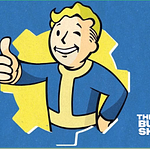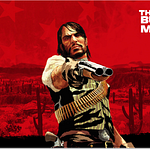Listen now on Apple, Spotify or YouTube
In This Edition
Zynga CEO Frank Gibeau
- Growth in mobile games
- Launching PC/console IP on mobile
- Closing Star Wars Hunters and Echtra Games
- App Store Changes, Web3, and beating TikTok
It was a struggle deciding the headline for today’s interview.
There was just an abundance of options. In my 40 minutes with Zynga CEO Frank Gibeau we covered the closure of Echtra Games. The decision to sunset Star Wars Hunters. The challenge of making PC and console games work in mobile. Backing out of Web3. Keeping a watchful eye on Discord and Telegram. Apple’s defeat at the hands of Epic. The (apparent) lack of growth in mobile. Zynga’s development process. What he learnt about acquiring companies from EA. The firm’s current stance on licensed games. And its relationship with new owner Take-Two.
And Gibeau gave insightful and open answers to all of it. So much so that I couldn’t fit all of it into this article. (I received the dreaded Substack warning that my email is too long. I had to cut it down)
But this is The Game Business, which means you can listen to or watch the whole thing above. And I recommend that option. I think it’s worth hearing.
But if podcasts and video are not your thing, I have done my best at choosing some selected highlights for you to read.
Enjoy!
“Mobile is a red ocean, but it’s ok if you’re a shark”
Zynga’s goal is to become the No.1 mobile game company in the world, with one billion monthly players.
Yet with Western mobile growth slowing, Zynga CEO Frank Gibeau is switching focus to emerging markets, where he believes another billion players will emerge.
“The scale of the market is so big now that it's hard to imagine you can see that double-digit growth,” he tells us. “You have to break the market apart to start to look for where growth is. Western Europe, North America, single digit growth, Japan, Korea, same deal. China's a bit harder to get into as a Western developer… it's big and growing fast, but it's got a lot of friction in terms of how you can get in there and build an audience.
“But then you look at India, Middle East… those markets are growing double digits comfortably. For the long term, those are going to be significant markets for us. Very high-performance smart devices are going into those markets that are very inexpensive.
“Mastering the complexity of those markets is what we're looking at right now. Do we look at geo pricing? How do you localize? How do you culturalize? Who are local partners? What are the payment differences? Mobile isn't declining. It's growing slower in the West and aggressively, from an audience standpoint, in emerging markets. Monetization is lagging, but it'll catch up.”
Gibeau adds that he still feels there’s big opportunities for Zynga in the West, even if it means taking market share from its rivals.
“This might sound cheeky. It is a red ocean, I guess, but it's okay if you're a shark. The idea is be aggressive and understand the dynamic that you're in, which is somebody has to lose market share for you to gain market share sometimes.
“Growth isn't as easy as is just going to fall to us. We have to have really sharp positioning. We have to understand who we're competing with, and have a proposition that players are going to love. It raises the stakes, but when you're a company like Zynga that's at scale, that has a lot of categories, a lot of genres, a lot of platforms, a lot of studios… we have a much better chance of succeeding than a sub-scale single product mobile studio that has difficulty reaching capital.”
Star Wars Hunters was no failure
In March, Zynga announced that its high-profile mobile and Nintendo Switch game Star Wars Hunters would be discontinued.
“We built a great tech base and a fun game,” Gibeau notes. “The problem was it wasn't a viable business. We weren't able to generate the organic installs from the license.
“We had some issues with how we could explore the intellectual property. Could you play Darth Vader or could you not? That sort of thing. We ended up with a cross-platform game on Switch and mobile that ran perfectly. It was fun. But it didn't engage over the long term. And it wasn't a viable business.”
Yet Gibeau says that Zynga simply takes lessons from moments like this and immediately applies them to another project.
“One of the things that you find in running studios, is sometimes you'll miss on the first shot. But there's something of value in it. You learn something about the market, you also learn about your team, and you have many times some great leads [developers] and a great tech base, but we didn't quite get there commercially… so we're looking at another idea in that category. The action shooter category on mobile is very large and growing, and we'd like to be there.
“Now we have an Unreal tech base, with some great leads in terms of the engineering, developers and designers…. Now it's taking the learnings from Star Wars Hunters and applying it to another shot on goal with another intellectual property.”
Gibeau added that getting used to failure is a core part of a successful mobile company, as long as the entire organisation can learn from it.
“We don't really consider them failures at the company,” he counters. “It's very difficult to get new products out on mobile in a successful way. You're going to have a lot of misses and you have to have a strong stomach and a culture for learning that oriented to: ‘hey, it missed. Why did it miss? Why don't we try this instead?’ For every game that doesn't reach its full potential, we go back, postmortem it, figure out what went right, what went wrong on the team, on the tech, on the go-to-market. Any number of reasons. And then we apply that and share that learning across the company.”
Take-Two doesn’t need Zynga making console games
Take-Two acquired Zynga for $12.7 billion in 2022. The publisher is known for being hands-off with its divisions, which also includes Rockstar and 2K Games, but there has been some shifts in Zynga’s strategy as a result of the acquisition.
In 2021, Zynga acquired Torchlight 3 developer Echtra Games to help it expand into PC and console gaming. However, now it has Rockstar and 2K as sister companies, this is no-longer a focus for Zynga. Echtra Games was closed last month.
“As part of Take-Two, the need for Zynga to go after that isn't a top priority,” Gibeau says.
“When you think about going onto PlayStation or Xbox for Zynga…. That's not as precious as 2K and Rockstar doing that. What's more important for us is the opportunity in mobile where frankly our expertise, talent, and capabilities are strongest. That was part of a thoughtful conversation with Take-Two about how do we deprioritize that strategy relative to other opportunities that were larger for us.
“I think for the team and for the company, it's the right call. And obviously anytime we divest a business or start to look at not doing something, we handle it in a transparent and professional manner with everyone.”
AAA games can succeed on mobile, but you need to go back to the fundamentals
One of the areas where Zynga does cross-over with Rockstar and 2K is in bringing some of their IP over to the mobile space. We’ve talked about traditionally console and PC games moving over to mobile a few times on The Game Business, so what’s Gibeau’s view on the opportunity?
“There's an opportunity for it, no question. But the last few years is littered with examples of it not working. Where [games] are brought over in a very conventional and expected way, and it's not fit for purpose for how mobile games are played.
“You have to look at how your players are going to engage with the content on a mobile device as they move through their day. If you just bring it over and play it as you would on a PlayStation, it doesn't work, it doesn't scale … It can work as a premium product, but as a free-to-play live service that can last years, you have to rethink how the intellectual property will work.”
“If you just bring [your console game] over [to mobile] and play it as you would on a PlayStation, it doesn't work, it doesn't scale”
One of our early interviews was with games analyst Matthew Ball who identified PC and console games going to mobile as a real growth opportunity, but Gibeau says that mobile is not just another screen in which to play console games.
“I don't think it's another platform like Switch or Xbox or PlayStation where you're looking at a multi-platform launch,” Gibeau explains. “It fundamentally serves a different entertainment need. That doesn't mean that they can't be linked or cross play. There are good examples of that working at scale with things like PUBG. But when you're talking about a linear game or a game that's narrative based, predominantly single player, those are tricky to bring over.
“Games that have a free-to-play business model versus a premium model tend to do better on mobile because you reach larger audiences globally. So, you have to decide is the intellectual property appropriate for that type of business model? Many IPs are not.”
He continued: “You have to almost restart at the fundamentals to understand how people are going to engage with it. If it's just your PlayStation game on your phone, you're not going to play for 45 minutes to get through a level. You need power. Are you on the bus? At school? At work? You're getting text messages while you're playing… work emails are coming in... you have to understand that this is a multifunctional device and part of busy lives.”
Zynga backs away from Web3, but eyes Discord and Telegram
In 2023, Zynga announced it was working on a Web3 project called Sugartown. Yet last year, it sold the project to a new company called D20.
“There was a lot of discussion and debate about blockchain and NFTs, and can it be part of an entertainment experience? There had been a couple of examples of companies that built some interesting and valuable franchises. So, we embarked on building a product to see what types of things worked and didn't work. Ultimately we found that it wasn't the right opportunity for us at this time. The technology is very interesting, but it's a very complex and undeveloped market, let's just say legally.
“It was worthwhile going through the exercise. We learned a lot. But we felt that we really weren't able to build something significant there. So we moved on to other ideas. That’s part of our culture, which is build something to see if it works, as opposed to debate over PowerPoints.”
Gibeau points to Zynga’s early investment into Facebook Messenger with Words With Friends. So does that mean it’s planning titles for the new wave of social platforms, such as Discord and Telegram?
“We haven't announced anything, but we're always looking for audience. And obviously if you look at TikTok, the emergence of Discord, the emergence of Telegram, there's a lot of new platforms out there that people are spending time on.”
Zynga to invest more aggressively following App Store ruling
The big mobile story of the year is Epic’s defeat of Apple in the US, which has opened iOS up even more for developers to sell directly to its customers.
Zynga has been selling direct for a while, but the new changes reduce the friction in doing that, and Gibeau believes this will prove transformative, and not just because of the extra revenue it could bring in.
“It's a profound change. The notion that you can have a direct relationship with your players and serve them better, and give them more value, is huge. It's not just about making more margin, we can perform better CRM, we can build better communities, we can understand more clearly what's happening in the games because, while we get a lot of telemetry, the idea that we can communicate with our players in a much more direct manner is going to create a more valuable relationship.
“We're going to be able to serve them faster, more efficiently, and generate more value for them. That will create more profit, which would allow us to invest more money in development and in user acquisition, so we can scale games better.”
Zynga scaling back on licensed games
It’s hard to deliver hit new IP in the current mobile market, but Zynga has had a few recent successes in Color Block Jam and Match Factory.
The two titles sit alongside some of its licensed projects based on Harry Potter and Game of Thrones. And I asked Gibeau how significant these licensed games are to its overall business.
“It's a pretty good portion of our portfolio, but it has been declining,” he said. “Strauss [Zelnick, Take-Two CEO] has been very clear that Take-Two’s primary objective is to create intellectual properties that are wholly owned, and that is absolutely the bias at Zynga as well.
“That doesn't mean that our partnerships with Harry Potter or Game of Thrones aren't valuable, but as we look at new projects to greenlight, we can reach audiences without the benefit of a license probably cheaper and more efficiently, because much of reaching audiences now is about ad creative. How many ads can I put out that are tailored and specialized? How can I experiment? When you're working with somebody else's intellectual property, it's very difficult to be generating 300 ads a week and pushing it through their systems for legal approval. Those guardrails and that inefficiency is particularly painful in how dynamic the market has become.”
That’s it for today! I do recommend watching/listening to the full interview, if you have time. We’ll be back Thursday where we’ll be taking another broad look at the state of the games market. Until then, thank you for reading.
















